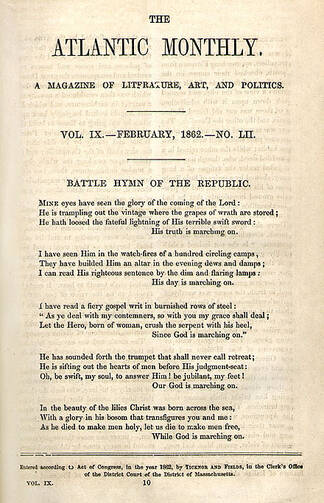Is it possible to dream the future? Of course we do that daily, authoring our own day dreams. But what of those moments when the conscious mind rests and the utterly creative awakes? Is it all illusion, or do we sometimes see the future?
A fervent abolitionist, Julia Ward Howe regretted that she couldn’t take up arms to free the slaves. In so many ways, this 19th-century poet and writer wasn’t free herself. Her husband, Samuel Gridley Howe, was a celebrated physician, who thought that his wife should bear his children and focus her life upon his concerns.
One day, Julia watched a review of Union troops outside of Washington. They were singing “John’s Brown’s Body” a ballad extolling the executed abolitionist, who had made Kansas bleed and the nation tremble because, as he had proclaimed, God’s justice demanded the immediate emancipation of the slaves. The United States government hung John Brown, but the future he foresaw still came to pass.
Julia Ward Howe remembered:
In the first moments of consciousness, Julia Ward Howe’s creativity penned what we now call “The Battle Hymn of the Republic.” Published in The Atlantic Monthly and sung to the tune of John Brown’s body, the song went viral, as we would say today, changing the war’s narrative from secession rights into a crusade for freedom.
Howe claimed that the song came to her on the border of consciousness, linking the Christ of long ago to the future of the war and the freedom of the slaves.
No one who preaches the Gospel can extol war. It is ever a curse and a sorrowful affliction. Yet consider the strength that Union soldiers took from this song, the consolation that Union families found in it. On June 8, 1968, as the train bearing the body of Senator Robert Kennedy rolled through Baltimore on its way to the capitol, the crowd along the tracks broke into the hymn’s refrain. I remember the song on the night of Sept. 11, in New York City. It wasn’t sung against someone; it was sung for those who had suffered a terrible injustice.
As America observes Memorial Day Weekend, the church celebrates Corpus Christi, the Solemnity of the Most Holy Body and Blood of Christ. The feast exists to foster devotion to the presence of Christ in the Eucharist. Paradoxically, pondering the humanity of our Savior is one way to see the extraordinary divine gift, which is the Eucharist.
The church professes that Christ was always “true God and true man” but that declaration doesn’t address the nature of his consciousness, his creativity. We have no interior access to the mind of Jesus, no way to watch how his divine and human natures interacted with one another. We do know that Christ possessed faith, which suggests that his incarnation represented some emptying of his divine consciousness. So our Lord would have come to that supper, the night before he died, a true man, one who had even reason for fear for his future, knowing that death was nigh.
That night Jesus did something similar to Julia Ward Howe. Seeking solace and strength in the past, he immersed himself in the faith of his people, reciting the promises made to Israel. And with radical hope for the future, the Son of Man gave himself over to the God of Israel, calling him “Father.”
When the church prays in that same voice and measure, expressing the very same surrender to the Father, we believe that Christ is truly present among us, in the mystery of his Body and his Blood, a sacramental splice between the ancient past and the, yet distant, future. By the power of the Holy Spirit, the church stands with the Son, giving herself completely into the hands of the Father. What St. Augustine said of the church singing psalms is ever truer of the church in Eucharist, “Whenever you hear the voice of the body, do not separate it from the voice of the head; and whenever you hear the voice of the head, do not separate him from the body” (En Ps 33-50, 151-152).
Still greater than the mystery of his presence in our midst is our inclusion in his offering of self. That’s why—even in a tabernacle, in a monstrance or in a pyx on its way to the hospital—the Eucharist is always ordered toward community, toward praise, toward reception of the gift and sacrifice of the self.
“As He died to make men holy, let us die to make men free.” Here is the great paradox and challenge of faith: we only free ourselves, when we die to ourselves.
Genesis 14: 18-20 1 Corinthians 11: 23-26 Luke 9: 11b-17








